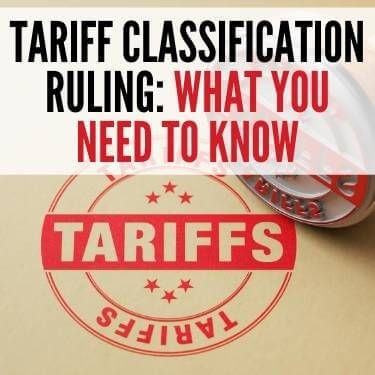
Tariff classification rulings determine the Harmonized Tariff Schedule (HTS) provisions that apply to goods you would like to import. These rulings are an extremely valuable resource for importers. But how do you get a tariff classification ruling and why are they so important?
A tariff classification ruling can be obtained from the CBP with the help of a Licensed Customs Broker. There are a number of details that are required to process a binding ruling. Once complete, the ruling will describe the exact requirements that your import must adhere to. The ruling also provides the exact import duty that must be paid.
USA Customs Clearance, powered by AFC International, can file a tariff classification ruling request on your behalf. We’ve helped many of our clients obtain a binding ruling which simplifies the customs clearance process. Our team is ready to help you get this done.

Worried about the Strict Regulations? Ask Our Experts.
Our 45 Minute Licensed Expert Consulting Will Personally Guide You.
For more information on the tariff classification ruling, read through our comprehensive guide below.
A tariff classification ruling is an official notice provided by the CBP that outlines what HTS code applies to goods being imported. The HTS code determines the import duty and applicable import requirements that your products need to adhere to.
When applying for a tariff classification ruling, CBP requires specific information about the products including:
Failure to include any of these details can result in your request being delayed until the information is provided.

In reality, a classification ruling is entirely voluntary. Its purpose is to clarify all relevant details and requirements of an import before it takes place. This includes confirming the applicable import duty. Without receiving a classification ruling, there is a possibility that your shipment may not be in compliance with requirements and you may get hit with a higher import duty than expected.
You can think of classification rulings as an administrative aid for any company wanting to import goods into the US. It reduces the chance of non-compliance and increases the chances that your merchandise will arrive without unnecessary delays.
Classification rulings can be helpful in a variety of situations. A number of countries have trade deals with the US allowing importers to pay lower duties - or none at all. Classification rulings tell you whether any special duty rates apply or whether there are trade programs that might benefit you. Sometimes, the nature of the ruling depends on the countries in which source materials were harvested or the location in which various production steps occurred.
Classification rulings can be helpful for importers sourcing goods from countries with trade programs and agreements with the US. The United States is currently a member of the United States Mexico Canada Agreement (USMCA) which allows goods to flow freely between Mexico, Canada and the U.S. with minimal or zero import duties. In addition, some goods coming from Africa may also be able to benefit from programs such as the African Growth and Opportunities Act.
Here’s a summary of important facts:
Binding ruling requests are submitted to the National Commodity Specialist Division (NCSD) of the CBP. This specific group is directly responsible for handling and processing all ruling requests. The request can be submitted electronically by the importer or by a customs broker on behalf of an importer.
As noted above, specific product information is required to be included in the request. Missing or incorrect details will delay the processing of your request or lead to rejection. Additionally, if you’re requesting a ruling related to country of origin, marking, or a trade program more information is required.
It’s important to note that the ruling request must relate to an actual shipment of goods. This means that ruling requests can’t be submitted prior to scheduling or having preliminary details for an upcoming shipment. The likely reason for this is that CBP is focused on efficiency. With this approach, CBP doesn’t have to review and process requests for products that might never even be shipped to the U.S. Instead, they’re strictly focused on goods that are scheduled to enter the U.S. market.
Our customs clearance team can submit a binding ruling request on your behalf. We’ve worked with countless clients to ensure that their request is submitted quickly and accurately. Allowing our team to handle this task for you saves you time and stress.

Worried about the Strict Regulations? Ask Our Experts.
Our 45 Minute Licensed Expert Consulting Will Personally Guide You.

Once submitted, importers will receive a confirmation email telling them that the NCSD has received their request. The e-mail confirmation also includes a unique binding control number.
In most cases, rulings are processed within 30 days of their initial request. Sometimes pleas can take up to 90 days if the NCSD needs to consult with laboratories or other government departments about the nature of the goods.
When the shipment pertaining to a tariff classification ruling arrives in the U.S., a copy of the ruling or the ruling control number needs to be included. This serves as a notice to CBP that the product is accurately classified with the correct HTS code.

Worried about the Strict Regulations? Ask Our Experts.
Our 30 Minute Licensed Expert Consulting Will Personally Guide You.
There are plenty of things that you need to take care of for your business. Adding another task to your already long list can be avoided by partnering with us.
USA Customs Clearance will relieve the headache of dealing with a tariff classification ruling. We’ll request the ruling request on your behalf, eliminating all of the administrative hassle. Once your request has been approved, you can import your products with complete peace of mind.
Speaking of importing, our team also provides critical customs clearance services to complete the import process. These services include:
We’re ready to be your one-stop shop for all of your customs clearance and supply chain needs.
Schedule a customs consulting session with one of our licensed customs brokers today to get started.
 Copy URL to Clipboard
Copy URL to Clipboard
Add your first comment to this post